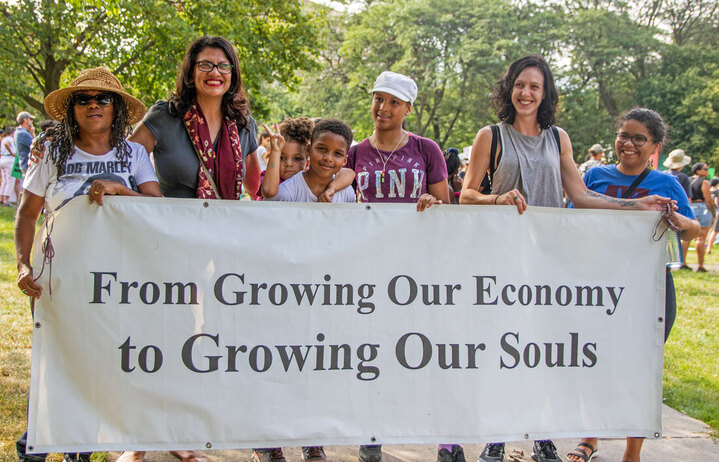
Representative Ocasio-Cortez introduced her version of the New Green Deal to the House in February 2019. What I find most compelling about this legislation is the way in which it understands the climate crisis as intersectional. Here are three important sections (quoted) from the Bill.
- "Climate change constitutes a direct threat to the national security of the United States ... by impacting the economic, environmental, and social stability of countries and communities around the world; and by acting as a threat multiplier."
- It is the duty of the Federal Government to secure for the people of the United States:
- "Clean air and water"
- "Climate and community resiliency"
- "Healthy food"
- "Access to nature"
- "A sustainable environment"
- "Clean air and water"
- "Frontline and vulnerable communities ... to promote justice and equity by stopping current, preventing future, and repairing historic oppression of"
- "indigenous peoples"
- "communities of color"
- "migrant communities"
- "deindustrialized communities"
- "depopulated rural communities"
- "the poor"
- "low-income workers"
- "women"
- "the elderly"
- "the unhoused"
- "people with disabilities"
- "youth"
- "indigenous peoples"
What do these three points say to me, as a music teacher?
- Climate change is the cause and a multiplying factor in exacerbating the current ecological crises. In this document, Ocasio-Cortez and other House members link economic, environmental and social stability. There are people out there who want to separate the economic and environmental challenges from the very idea of social stability. Some even claim uprootedness is good. But, even if physical movement ought to be free, it is better for all if there are stable communities between which one might move. I have argued that it by being rooted in locations that we are able to respond to the ecological challenges. Social rootedness seems to be identified as a "good" in the New Green Deal, which is consistent with ecological scholarship. Because the climate crises are uprooting (extended droughts in Syria and Central America have caused and exacerbated the current refugee crises in the U.S. and Europe). As music teachers, we can begin by performing and creating music that celebrates the beauty of nature, the histories of the places where we reside, and the epistemologies of the communities our students are in. We can experience the other from a stable self, just like we can aid refugees when we reside in place ourselves.
- Ocasio-Cortez's New Green Deal identifies certain duties of government. Of interest to me as a music teacher is climate and community resiliency and access to nature. In my grandfather's generation there was a great public movement to create new parks. Biologist E.O. Wilson calls for half of the earth being converted into some sort of wilderness preserve to stem the species-loss crisis. Protected spaces can be a point of pride for rural, urban, and suburban communities. Local, state and federal efforts can be made to create new parks that serve as points of pride and homes for wildlife. Perhaps as music teachers we can sing and have our students write songs that recaptures this ethic of conservation and park creation.
- This list of frontline and vulnerable communities provides an extensive list of intersectional identities. Music teachers can help by creating solidarity; recognizing how our students are vulnerable (even oppressed in Freirean terminology). For instance, where do we open space in our pedagogy for indigenous, rural, elderly, and the unhoused voices? Musics? Our teaching practices can be made robust by expanding the voices we bring into our classrooms.
On a final note, John Bellamy Foster connects the history of Ocasio'Cortez's effort with the efforts of Bernie Sanders, and Jill Stein before her. He challenges the New Green Deal approaches: "None consider the full level of waste built into the current accumulation system and how that could be turned to ecological advantage. Instead, all of the plans are based on the notion of promoting rapid, exponential economic growth or capital accumulation—despite the fact that this would compound the planetary emergency, and in spite of the fact that the real successes of the Second New Deal had much less to do with growth than economic and social redistribution."
So, I end this post with a comment and question. The New Green Deal seems like a strong piece of legislation that will move us in the right direction. It will not put the ecological challenges entirely behind us, but it will get us moving in the right direction -- toward a sustainable and regenerative culture. But, can legislation do what Foster wants, and address the waste that is intrinsic to capitalism?
DJS
 RSS Feed
RSS Feed
